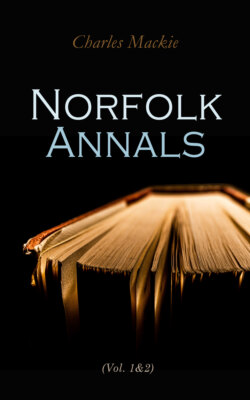Читать книгу Norfolk Annals (Vol. 1&2) - Charles Mackie - Страница 204
На сайте Литреса книга снята с продажи.
MAY.
Оглавление3.—At a quarterly meeting of the Norwich Corporation it was ordered that the Hospital and City Committees be empowered to recommend to the next assembly to make such abatements in the rents of the Corporation farms as they might think necessary in consequence of the reduced price of grain, wheat being from 36s. to 37s.; barley, 11s. 6d. to 13s.; and oats, 9s. 6d. to 10s. 6d. per coomb.
11.—The first division of the West Norfolk Militia, under command of Col. Nelthorpe, marched into Norwich on their return from Ireland; the second division, under Major Barnham, arrived on the 13th. The regiment was disembodied on June 17th.
—*“Died in September last at Allahabad, in his 32nd year, Richard Turner, jun., Judge of the Provisional Court at Agra, and eldest son of the Rev. Richard Turner, Great Yarmouth.”
16.—A serious riot occurred at Norwich. A crowd assembled in the Market Place, threw fire balls and broke the windows at the Guildhall. They then broke into the New Mills, threw a quantity of flour into the river, and carried some away in sacks. On their return from the Mills they smashed many windows in St. Andrew’s, Bank Street, Tombland, Magdalen Street, and other localities. Dr. Alderson came out of his house to remonstrate with them and was knocked down. The Mayor and magistrates assembled at the Guildhall, special constables were sworn in, and the mob dispersed. A picket of the West Norfolk Militia was stationed all night at the Guildhall, and a party of the 1st Royal Dragoons patrolled the streets. The disturbances were renewed on the 18th, when the Riot Act was read, and the mob dispersed by the military.
18.—The proprietors of the Norwich Expedition coach to London by Thetford and Newmarket announced a reduction of fares to £1 15s. for inside, and £1 for outside passengers. From this date the Expedition started at three o’clock in the afternoon and reached London at nine o’clock next morning.
20.—A riot took place at Downham Market. The magistrates assembled at the Crown Inn were publicly insulted, and so much disorder ensued that the Upwell Yeomanry Cavalry were called out, and the Riot Act read, after which the crowd gradually dispersed. A demand had been made for wages of 2s. per day to be paid every Monday and Thursday. In consequence of the farmers having refused to comply, another disturbance took place on the 24th, when two women and several men were apprehended and committed to Norwich Castle. The prisoners were charged at the Norfolk Assizes, held at Norwich in August, before Lord Chief Justice Gibbs, when sixteen were found guilty and sentenced to death, but only two, Daniel Harwood and Thomas Thody, were left for execution, which took place on the Castle Hill on August 31st. “The recollection of his wife and children and the horror of immediate death overcame Thody’s fortitude. He was nearly sinking down under the agony of grief and terror, which he expressed by convulsive shrieks, and was obliged to be supported by several men.”
22.—At a meeting of owners and occupiers of land, at Diss, a series of resolutions was proposed by the Rev. Mr. Manning, rector, in favour of the commutation of the tithes. It was decided to petition the House of Commons on the subject. Similar meetings were held in other parishes in the district.
27.—Mrs. Mardyn, of Drury Lane Theatre, commenced an engagement at Norwich Theatre as Albina Mandeville in the comedy of “The Will.” On succeeding evenings she appeared as Amelia Wildenham (“Lovers’ Vows”), Widow Brady (“The Irish Widow”), Miss Peggy (“The Country Girl”), and Miranda (“The Busybody”).
28.—At a “grand wrestling,” which took place at Kirby, twenty-four “professors” entered the ring, and “a finer display of science was never exhibited.” A man named Starling was the winner. “A smart milling took place between Broughton and Ives, the former a regular descendant of the great pugilist of that name. Ives proved entirely destitute of science and was badly beaten.”
31.—Under the sanction of the Norwich magistrates and the Court of Guardians the defective silver of the labouring poor of the city was exchanged for current coin.
